There's still time to apply! Accepting applications for Fall 2026 with scholarship support available. Apply now!
Menu
Menu
There's still time to apply! Accepting applications for Fall 2026 with scholarship support available. Apply now!
Join the Scrivner Institute of Public Policy and Sié Chéou-Kang Center for International Security and Diplomacy exactly one year after the inauguration for a discussion with our faculty experts to reflect on the first year of the second Trump Administration. Our faculty panelists from Korbel and the College of Arts, Humanities, and Social Sciences (CAHSS) will explore key developments in domestic and foreign policy, shifts in political norms and dynamics, and the broader implications for governance and society. Audience questions are welcome and encouraged.
Event moderators will include Professors Naazneen Barma and Rachel Epstein, and panelists will include Professors Deborah Avant, Seth Masket, Martin Rhodes, and Rachel Sigman.
Food provided - casual dinner.
Doors will open at 5pm for food and seats to be taken; discussion will begin at 5:30pm.
Tariffs have been at the forefront of President Trump's first year in office, creating uncertainty for consumers, businesses, international trading partners, and the global economy. The sweeping tariff policy also poses pressing questions — currently on the Supreme Court’s docket — about the limits of executive power. This discussion will explore the evolving impact of the Trump Administration’s tariff policies on global trade and international relations, as well as examine the economic, constitutional, and political stakes in the United States.
Denver Dialogues is an event series hosted by the Josef Korbel School of Global and Public Affairs and the Scrivner Institute of Public Policy, in partnership with premier American think tanks, to model civil discourse about major issues facing the nation and the world.
Registration required. Please register here.
Over three immersive days in the Yampa Valley in northwestern Colorado, community leaders from across the state gathered for the final stop on the Colorado Project’s Rural Learning Tour. Convened by the University of Denver’s Josef Korbel School of Global and Public Affairs and the Scrivner Institute of Public Policy, the Colorado Project is a statewide effort to advance shared prosperity, sustainability, and inclusive growth in every region of the state. The Yampa Valley convening offered a clear view of both the opportunities and challenges facing rural communities. Guided by the project’s cornerstones—sustainability and resilience, economic mobility and workforce, cost of living, and entrepreneurship and innovation—participants engaged directly with local partners who are shaping the Valley’s future.
The convening kicked off in Craig with a site visit to Fitch Ranch Artisan Meat Co, where we learned about small-scale meat processing supporting local ranchers. That visit was followed by a roundtable with local leaders including the City of Craig, the Small Business Development Center, and Memorial Regional Health, framing the region’s need for economic diversification, small business vitality, and healthcare access.

Day two in Hayden focused on infrastructure solutions, economic development, and workforce needs. A visit to the Yampa Valley Regional Airport showcased the need for creative transportation options to the region, which is approximately a 3.5-hour drive from Denver’s airport. An opening conversation with the Yampa Valley Community Foundation at the historic Hayden Granary grounded participants in regional history and values, and an economic development and workforce panel explored career pipelines, employer needs, and regional collaboration opportunities. A Hayden Heritage Walking Tour showcased main street revitalization efforts and community-led placemaking.
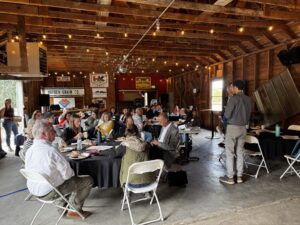
The final day underscored the valley’s creative and systems-level approaches. Site visits to Steamboat Creates and the Yampa Valley Foods Marketplace highlighted how arts, culture, and local food systems contribute to economic resilience. A session on mental and behavioral health support examined cross-organization coordination to improve access and outcomes. A cost-of-living panel with representatives from Colorado Mountain College, the City of Steamboat Springs, Yampa Valley Housing Authority, Northwest Colorado Health, and Routt County surfaced strategies around attainable housing, childcare, and workforce stability. The convening concluded with a collaborative session focusing on key takeaways from the Rural Learning Tour and exploring next steps for the Colorado Project, with participants affirming their commitment to continue engaging.

The Yampa Valley convening underscored that rural Colorado is actively building solutions, linking energy transition and infrastructure planning with workforce pathways, pairing cultural and agricultural assets with entrepreneurship, and aligning local leadership around attainable housing and community wellbeing. As the Rural Learning Tour concludes, lessons from the three convenings—Northeast Colorado, the San Luis Valley, and the Yampa Valley—will inform the Colorado Project’s evolving roadmap for inclusive and resilient growth, ensuring that rural ingenuity remains central to Colorado’s future. Stay tuned for the project’s next steps!
This reflection was written by current Korbel graduate student, Erin Mitchell (Master of Public Policy, 2026).
On October 7, 2025, I had the distinct honor of attending the Axios Denver Newsmakers event, hosted by Korbel’s own Scrivner Institute of Public Policy, and sponsored by The Denver Foundation. The event featured an engaging and insightful question-and-answer session with Denver Mayor Mike Johnston, focused on the proposed Vibrant Denver Bond, a five-part, $950 million general bond question that will appear on the November 4, 2025, ballot. Beyond listening to the discussion, I also had the incredible opportunity to speak directly with Mayor Johnston, gaining firsthand insight into how local leaders approach complex policy challenges.
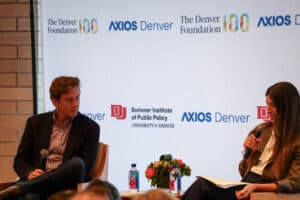
The event began with an overview of the proposed bond, setting the stage for an in-depth conversation about how public financing can shape the city’s future, which provided a rare opportunity to hear directly from the mayor about one of the most significant public financing proposals in Denver’s recent history. The Vibrant Denver Bond is designed to fund critical capital improvement projects across the city, addressing infrastructure, housing, and community development needs. Mayor Johnston emphasized that the bond’s five components, affordable housing, transportation and mobility, parks and recreation, public facilities, and economic development, represent strategic investments in Denver’s long-term vitality and inclusivity.
During the conversation, Johnston highlighted the city’s urgent need to expand affordable housing and improve public spaces to maintain Denver’s quality of life as the population continues to grow. He explained that the bond would not increase property tax rates but would instead reauthorize expiring debt, allowing the city to reinvest in essential infrastructure without overburdening taxpayers. This approach, he argued, reflects responsible fiscal management while ensuring the benefits of growth are broadly shared.
Following the bond discussion, the audience was given the opportunity to ask questions, which touched on issues such as homelessness, climate resilience, and economic equity. Mayor Johnston spoke candidly about balancing Denver’s rapid development with sustainability and social responsibility. He stressed the importance of public engagement and voter participation, noting that every Denver resident has a stake in shaping the city’s future.
This event truly reflected the civic spirit of collaboration between local government, academic institutions, and philanthropic organizations. Axios Denver’s format, focused, conversational, and journalistic, allowed thoughtful dialogue rather than scripted speeches. This approach ultimately led myself and several other graduate students having the unique opportunity to speak one-on-one with Mayor Johnston about the upcoming ballot issues and other pressing policy issues affecting Denver and the state of Colorado.
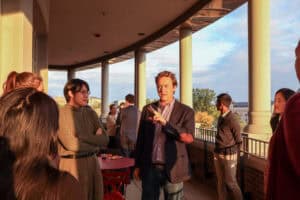
Mayor Johnston spoke openly and enthusiastically with us about everything from our future career goals to local development projects, including plans for the new Mile High Stadium and its role in Denver’s economic and recreational growth.
As a Public Policy student, I spend much of my time studying elected officials, their policies, and their impact on society, but I never expected to speak face-to-face with one. Korbel made that possible by facilitating these conversations with the mayor. His friendly, down-to-earth demeanor quickly put our group at ease, and as we stood on the Sie Complex balcony chatting as equals, it struck me that elected officials are, at their core, people like us. That moment brought to life what our work in public policy is all about: creating meaningful connections and striving, regardless of affiliation, to make our communities stronger and more equitable.
For me, attending the Axios Denver News Makers event was both informative and inspiring. It underscored the importance of civic participation and policy literacy, reminding attendees that democracy functions best when communities are informed and engaged. As Denver prepares for the upcoming vote, the discussion served as a timely reminder that the city’s growth and vibrancy depend on the collective choices of its residents. For me, as a student, it was a rare chance to witness these principles in action and to see firsthand how public policy shapes real communities, and it was a reminder that our studies are not just theoretical but are preparing us to actively contribute to the future of the city and the world around us.
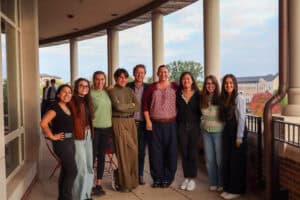
Colorado – From October 8–10, 2025, a diverse group of leaders from across Colorado will convene in Northwest Colorado’s Yampa Valley as part of the Colorado Project’s Rural Learning Tour. The Colorado Project is a statewide initiative designed to advance shared prosperity and inclusive, sustainable growth in all regions of Colorado. It is convened by the Josef Korbel School of Global and Public Affairs and the Scrivner Institute of Public Policy at the University of Denver.
Now in its second iteration, the Colorado Project is focusing on the distinctive challenges rural communities face and the innovative, locally driven solutions they are generating. The Learning Tour seeks to elevate this ingenuity, highlighting creative interventions in sustainability, economic mobility, and entrepreneurship.
The Yampa Valley convening will spotlight local leadership in climate action, housing affordability, workforce development, and economic diversification, with site visits across Craig, Hayden, and Steamboat Springs. Participants will learn about the Hayden Geothermal Industrial Park, explore collaborative land-use and downtown revitalization efforts, and engage with community-driven initiatives like Steamboat Creates, the Yampa Valley Food Marketplace, and the Yampa Valley Housing Authority.
Tammie Delaney, co-host in Hayden and community leader, emphasized the unique nature of the Valley: “The Yampa Valley is at the crossroads of tradition and transition. From ranching to renewables, we are learning how to preserve what makes this place special while preparing for the future. The Colorado Project gives us a chance to connect these efforts to a broader statewide conversation.”
Tim Wohlgenant, co-host and President and CEO of the Yampa Valley Community Foundation, highlights the importance of the Learning Tour coming to the Valley: “This tour is about elevating local voices and making sure rural Colorado is not left behind. By bringing people together across sectors, from housing and healthcare to energy and the arts, we’re building the partnerships that will shape a resilient future.”
Participants will also engage in panels on economic development and workforce, explore mental and behavioral health systems collaboration, and discuss collaborative solutions to address the Valley’s rising cost of living. The convening will close with a session dedicated to actionable next steps and commitments to align local solutions with statewide strategies.
The Yampa Valley is the final visit in the 2025 Colorado Project Learning Tour. It follows successful convenings in Northeast Colorado (June) and the San Luis Valley (August). Although this Learning Tour is drawing to a close, the project will continue to highlight success stories that lead to actionable policy solutions for the state.
Get smart on the issues that will shape Denver's path forward.
Join Axios Denver for an in-depth conversation on the 2025 ballot and the city’s proposed bond package. Local leaders, policy experts, and community voices will unpack what’s at stake for Denver’s future — from infrastructure and public safety to schools and neighborhood investment.
Thank you to our sponsor, The Denver Foundation, and our host, The Josef Korbel School, for making this event possible.
—
5:30pm Doors open
6pm Programming starts
Over three immersive days in the San Luis Valley, community leaders from across Colorado gathered for the second stop on the Colorado Project’s Rural Learning Tour. Convened by the Josef Korbel School of Global and Public Affairs and the Scrivner Institute of Public Policy, the Colorado Project is a statewide effort to advance shared prosperity, sustainability, and inclusive growth in every corner of the state. The San Luis Valley convening offered a vivid look at both the opportunities and challenges in rural Colorado. Guided by the Colorado Project’s four cornerstones — Colorado’s Promise, Sustainability and Resilience, Economic Mobility and Workforce, and Cost of Living — participants engaged directly with agricultural entrepreneurs, educators, nonprofit leaders, and civic partners who are shaping the future of their communities.
From the outset, the convening highlighted the Valley’s spirit of collaboration and resilience. At Adams State University, participants heard from President Dr. David Tandberg and community leaders on how educational institutions serve as an anchor for economic mobility across the region. Conversations at the Valley Roots Food Hub revealed the importance of strengthening local food systems and connecting family farmers to markets. At the Center Viking Youth Club, youth leaders and educators shared how mentorship and career-connected learning are expanding opportunity for the next generation. Tours of White Rock Specialties and discussions at the Colorado Farm Brewery demonstrated how creative agriculture ventures can drive economic growth.
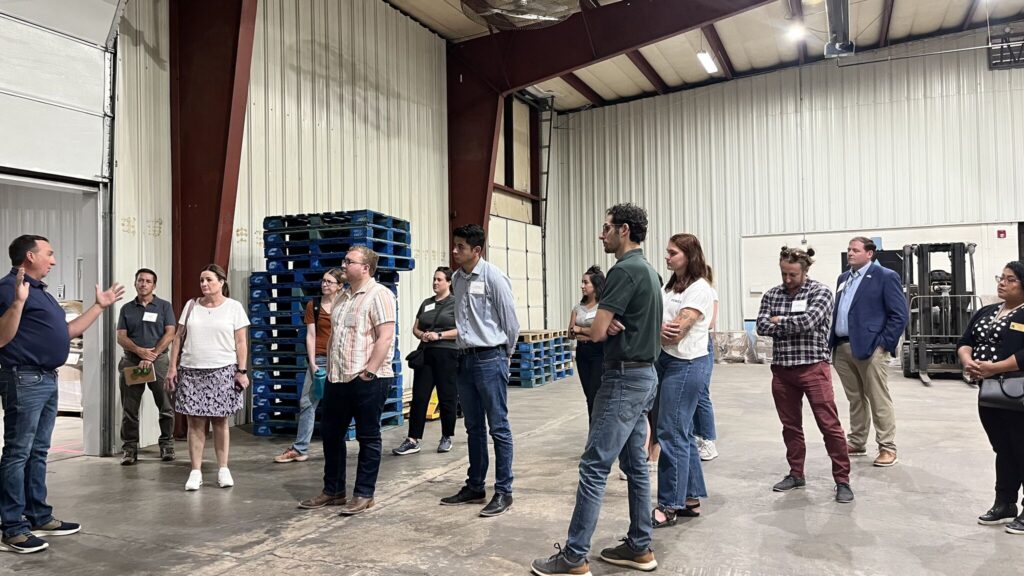
The final day brought innovation to the forefront. Participants began with a field demonstration of Barn Owl Precision Agriculture’s Autonomous Nano-Tractor, an AI-powered robot designed to help farmers and producers weed their crops in a more sustainable way. The demonstration offered proof that cutting-edge technology can support agricultural producers in ways that increase productivity while prioritizing sustainability and saving costs. At the Ski Hi Complex in Monte Vista, The Attainment Network’s San Luis Valley Career-Connected Partnership outlined pathways for training the local healthcare workforce, highlighting how collaboration between institutions can prepare local students for in-demand jobs while addressing pressing community needs. The day concluded with a panel hosted by the LOR Foundation, which highlighted their unique approach of listening locally, acting quickly, and investing in community-driven ideas to create lasting change in rural communities.
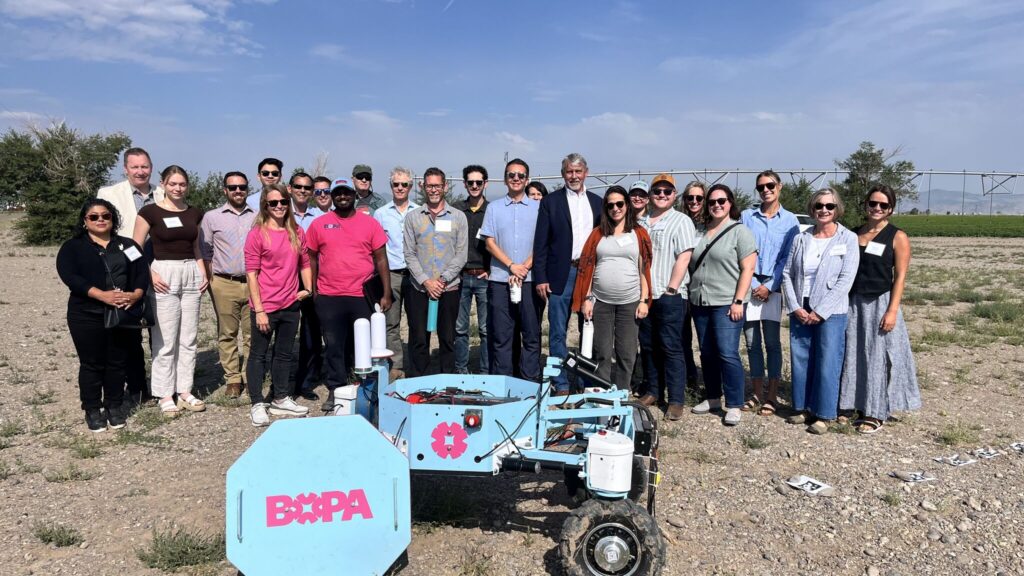
The San Luis Valley convening underscored that rural Colorado is not waiting on solutions, it is creating them. From agricultural innovations to career-connected education and community-led philanthropy, the Valley’s leadership is creating models that can inform the rest of the state. As the Colorado Project continues its Rural Learning Tour with an upcoming stop in the Yampa Valley, these lessons will carry forward as a roadmap for statewide prosperity. The San Luis Valley left participants with inspiration to honor the ingenuity of rural communities and ensure their innovations are woven into Colorado’s future.
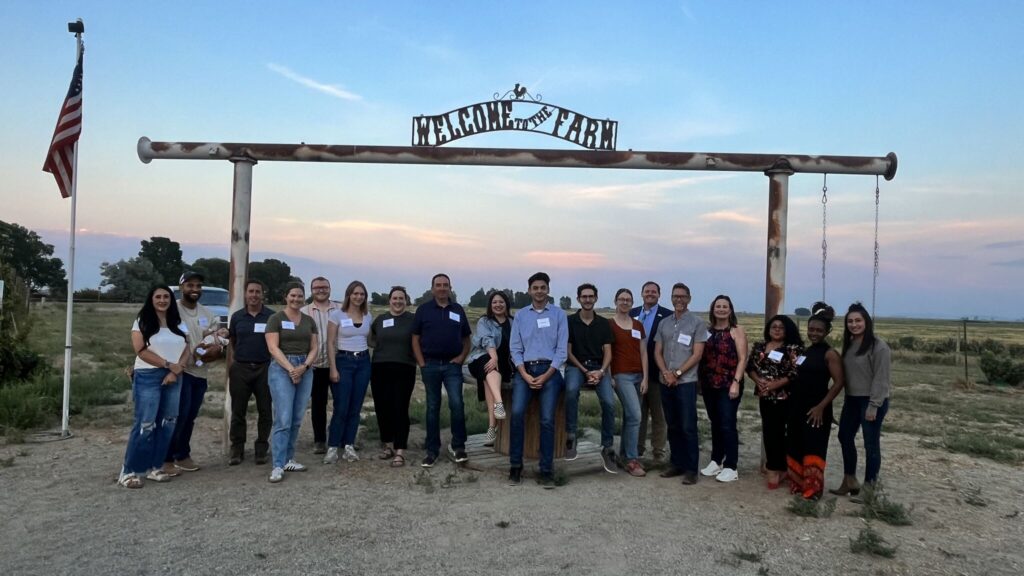
This reflection was written by Ahmad Saleem (MA, International Security, 2025), one of four students selected to represent the Josef Korbel School of Global and Public Affairs at the 2025 Aspen Security Forum.
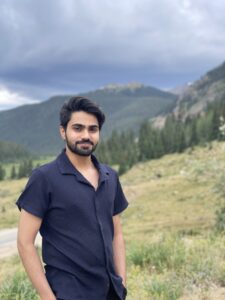
From July 15–18, I had the privilege of representing the Josef Korbel School of Global and Public Affairs as part of a student delegation at the 2025 Aspen Security Forum. As the only university partnered with the Forum, Korbel’s presence stood out—we were proud to be the only students attending among a distinguished gathering of world leaders, policymakers, and experts in global security.
The forum was insightful, exposing me to a wide range of opinions on pressing global issues. A recurring theme throughout the event was the growing role of artificial intelligence and cybersecurity in international security. In the session Cracking the Code: AI and National Security, we heard from Tarun Chhabra, Head of National Security at Anthropic and Distinguished Visiting Fellow at the Hoover Institution, Stanford University, and Katrina Mulligan from OpenAI for Government. These speakers, representing both public and private sectors, discussed how AI is poised to transform the security landscape. As an international security student, I was deeply intrigued by these discussions.
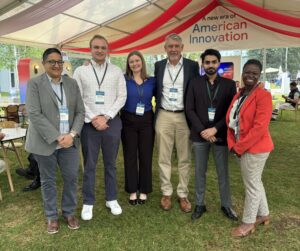
Another recurring theme was the future of European defense. A powerful session on this topic featured Baiba Braže, Minister of Foreign Affairs of Latvia. Following the discussion, our Korbel delegation had the privilege of engaging with the Latvian delegation, who kindly invited us to the upcoming Rīga Conference. Korbel also hosted a session at the Forum titled Russia, Ukraine, and Beyond. This session explored the geopolitical and defense implications of the Russia-Ukraine war and featured a remarkable lineup of speakers: Dr. Condoleezza Rice—Korbel alum and former U.S. Secretary of State—Pasi Rajala, Political State Secretary for Finland’s Foreign Ministry, and Halyna Yanchenko, Member of Ukraine’s Parliament and Head of the Investment Taskforce for the Defense Industry. The discussion emphasized the enduring importance of transatlantic partnerships and the need for sustained global support for Ukraine. It was a proud moment when Dr. Condoleezza Rice recognized Dean Fritz Mayer and the Korbel School for organizing the session.

The forum also came at a pivotal moment for Middle Eastern geopolitics. The session titled Israel at a Crossroads featured Amos Yadlin, former Chief of the IDF Intelligence Directorate, and Michael Herzog, former Israeli Ambassador to the U.S. and Tisch Distinguished Fellow at the Washington Institute for Near East Policy. They discussed Israel’s evolving strategic posture and described its military doctrine as one of “short, decisive, and limited war.” I appreciated that the forum also provided an alternative narrative through Dr. Vali Nasr’s book talk on Iran's Grand Strategy: A Political History. His presentation offered a deep dive into Iran’s domestic politics and its shifting strategic paradigms. Dr. Nasr argued that, in contrast to Israel’s doctrine, Iran’s strategy is oriented toward long-term, less decisive conflicts. These sessions together provided a comprehensive and nuanced understanding of regional dynamics.
One of the most fascinating sessions for me was Great Power Competition – Global POVs. This panel offered compelling perspectives from the Global South and included speakers such as Hina Rabbani Khar, Former Foreign Minister of Pakistan; Claudia Ruiz Massieu, Former Foreign Minister of Mexico; and Balázs Orbán, Political Director to the Hungarian Prime Minister. It was especially insightful to hear how different regions interpret great power dynamics—and why including these voices is crucial for shaping inclusive global policy.
Outside the formal sessions, I, along with other Korbel students, was invited to informal networking opportunities. These provided a chance to connect with professionals working in tech, defense, and government. As someone who aspires to work in think tanks, especially in Washington, D.C., I was excited to meet individuals from the Atlantic Council, Aspen Institute, Center for a New American Security, and Delphi Global. Many of them were already familiar with the Korbel School and expressed willingness to support me and my fellow students in our career journeys. Beyond these professionals, I also met a Stanford graduate who had recently founded an AI company supporting semiconductor development. These connections helped me not only network professionally but also draw inspiration from fellow academics and innovators.
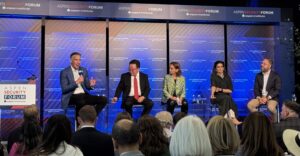
I returned from Aspen with a new perspective on global security issues and a wealth of connections. I truly felt that this opportunity, along with the Korbel School, provided a bridge between theoretical knowledge and real-world practice. I am deeply grateful to Dean Fritz Mayer, Prof. Naazneen Barma, and the Scrivner Institute of Public Policy for providing this opportunity. Experiences like this are a powerful reminder of how the Korbel School continues to empower students like me to connect academic learning with real-world policy and practice.
Colorado – From August 13–15, 2025, a diverse group of leaders from across Colorado will convene in the San Luis Valley as part of the Colorado Project’s Rural Learning Tour. The Colorado Project is a statewide initiative designed to advance shared prosperity and inclusive, sustainable growth in all regions of Colorado. It is convened by the Josef Korbel School of Global and Public Affairs and the Scrivner Institute of Public Policy at the University of Denver.
Now in its second iteration, the Colorado Project is focusing on the distinctive challenges rural communities face and the innovative, locally driven solutions they are generating. The Rural Learning Tour seeks to elevate this ingenuity, highlighting creative interventions in cost of living, sustainability, economic mobility, and entrepreneurship.
The San Luis Valley convening will spotlight organizations and initiatives in rural healthcare, food systems, affordable housing, and environmental stewardship, among others. There will also be a special focus on youth engagement and workforce readiness. Aaron Miltenberger, one of the co-hosts of this convening and President & CEO of the Boys & Girls Clubs of the San Luis Valley, emphasizes the importance of youth engagement in efforts like this: “Investing in our kids isn’t just the right thing to do—it’s how we build a stronger rural economy. When young people in the San Luis Valley get real skills, strong mentors, and the confidence to lead, they come back as nurses in Alamosa, teachers in Antonito, and business owners in Monte Vista. That’s how we grow—by investing in our own.”
Participants will visit Alamosa, Center, Monte Vista, and Mosca over the three days to tour a food distribution hub, learn about the revitalization of Main Street in Alamosa, meet with agricultural producers leveraging tech solutions for more sustainable production, and hear directly from community leaders from institutions like Adams State University, San Luis Valley Health, and the Boys and Girls Clubs of the San Luis Valley. Colorado Project participant Kurt Walker, a Korbel School alum and Ranch Manager at Pine Canyon Ranch, remarks “The San Luis Valley is proof that when we center equity and innovation, rural places can lead Colorado’s future.”
The San Luis Valley visit follows a successful convening in Sterling in June to better understand the context of northeastern Colorado. Following Alamosa, the Learning Tour will travel to Steamboat Springs and the Yampa Valley (October 8–10), where the conversation will turn to recreation-based economies and conservation finance. Each stop reveals distinct regional strengths, but the tour’s goal is unified: uncovering shared solutions for both rural and statewide prosperity across Colorado.
Over two immersive days in Sterling, Colorado, community leaders from across the state gathered for the inaugural stop on the Colorado Project’s Rural Renaissance Learning Tour. The Colorado Project, convened by the Korbel School and the Scrivner Institute, is a unique statewide effort to advance shared prosperity and sustainable and inclusive growth in every corner of the state. The Sterling convening offered insights into the opportunities and complexities of life in Northeast Colorado.
With a focus on the project's four cornerstones—Colorado’s Promise (access to prosperity in all Colorado communities), sustainability and resilience, economic mobility and workforce, and cost of living—participants engaged in on-the-ground conversations with local business owners, farmers, educators, elected officials, and civic leaders. The convening underscored a clear theme: rural communities hold important innovations for Colorado’s future, but they must be included in the conversations on long-term strategies.
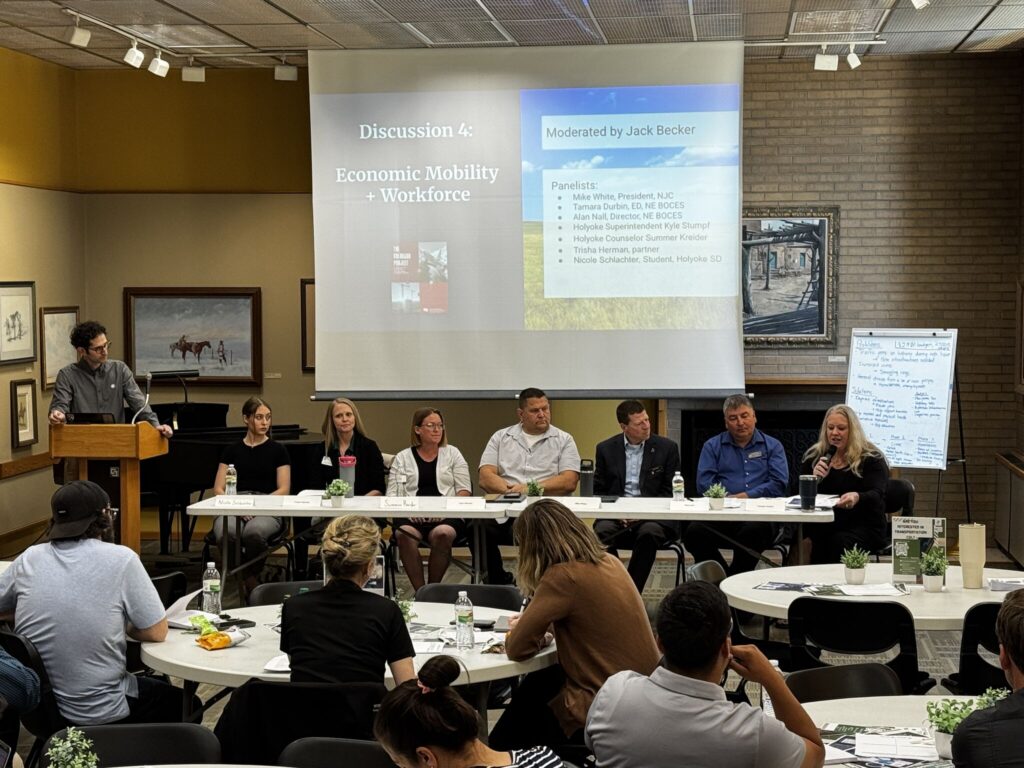
Regional Insights with Statewide Impacts
From touring wind turbine sites that are already creating skilled local jobs, to hearing K-12 and higher ed educators outline new career-connected programs, the convening offered a vivid snapshot of both successes and gaps. Participants examined local labor trends, housing affordability, sustainable energy, and economic infrastructure—all through the firsthand perspectives of those that live and lead in the region.
“Rural prosperity is Colorado’s prosperity--our future depends on every county thriving,” said Laurie Jones, Director at the Small Business Development Center in Sterling. Her words became a refrain across the convening, resonating with both first-time visitors and longtime regional partners.
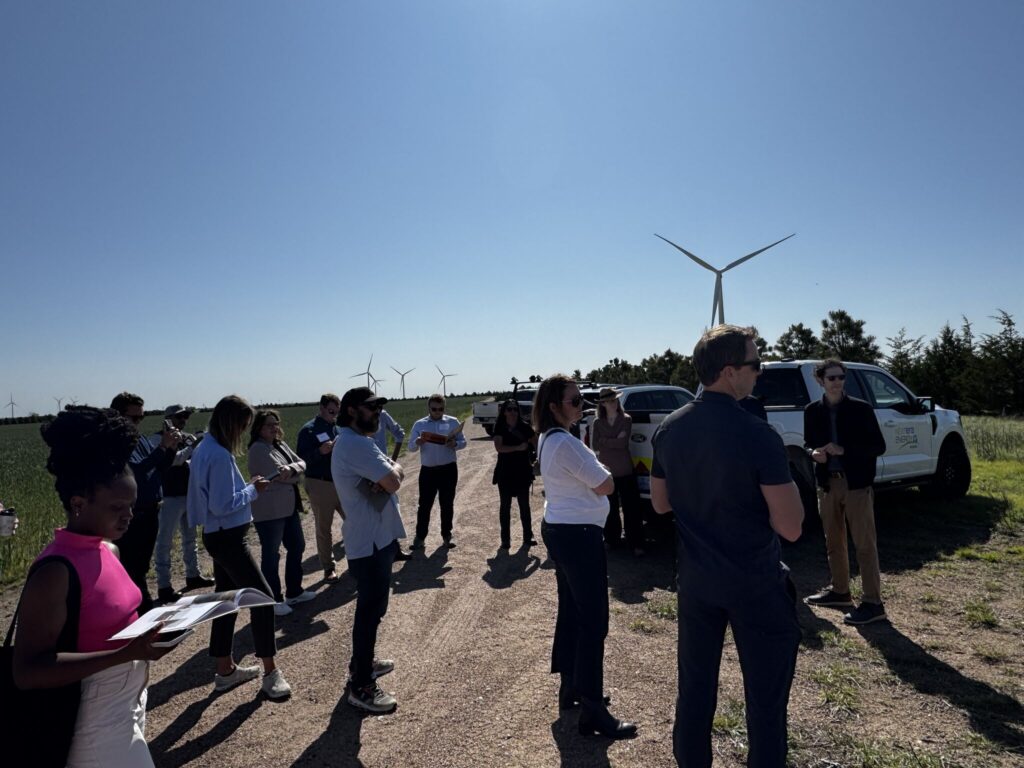
From Listening to Action
The convening was not just a listening tour; it was a platform to build. Sterling’s collaborative spirit and deep-rooted leadership provided a springboard for actionable ideas: from broadband and tech apprenticeships to renewable energy projects and local entrepreneurship support. This work will help shape the statewide playbook for investing in rural prosperity.
Sterling marked a powerful beginning for the Colorado Project. With the next stop in Alamosa scheduled for August, the Colorado Project continues to elevate community-driven insights into long-term strategies for rural success. It is laying the groundwork for a more inclusive, connected, and resilient Colorado.
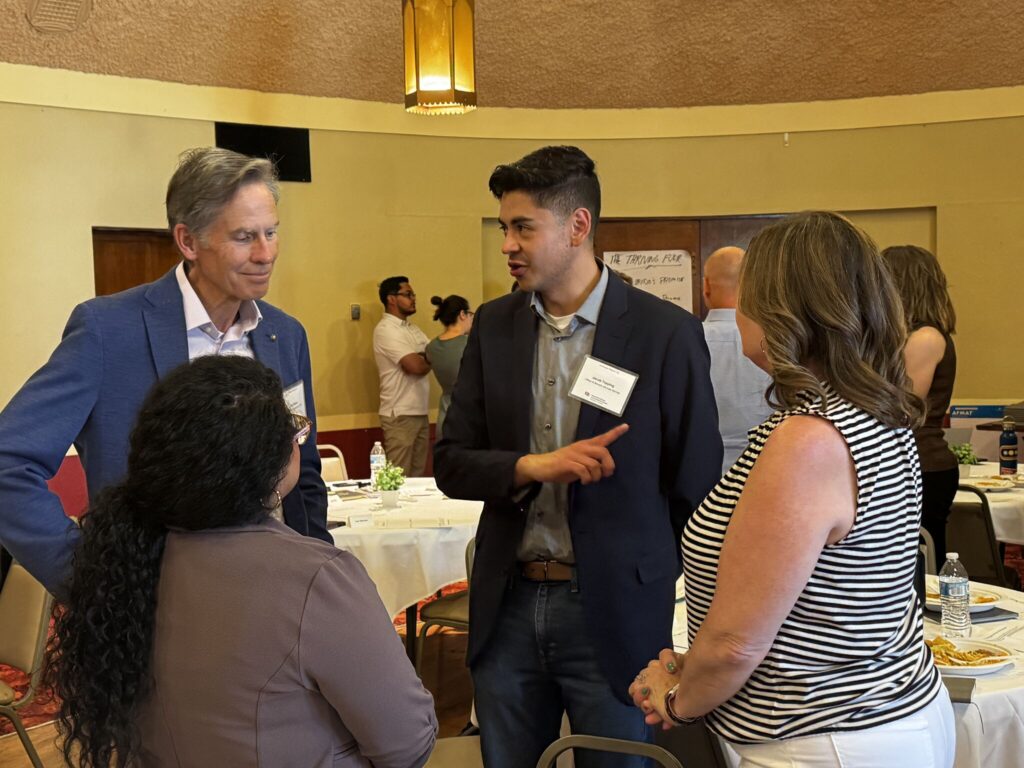
Copyright ©2026 University of Denver | All rights reserved | The University of Denver is an equal opportunity institution